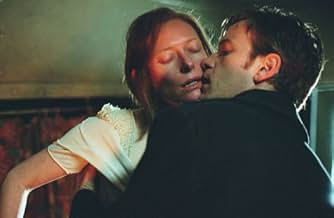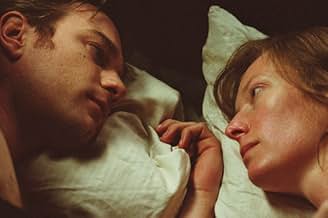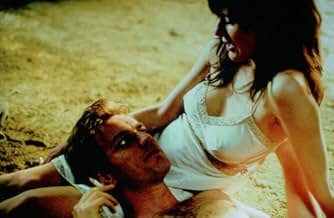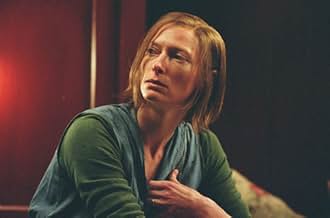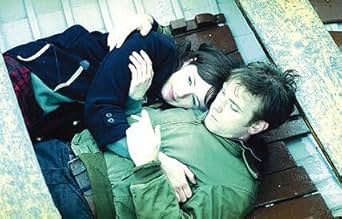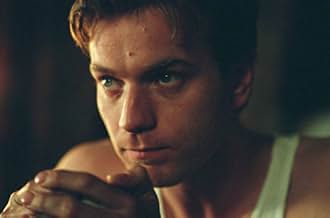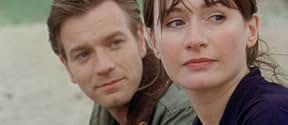IMDb रेटिंग
6.3/10
15 हज़ार
आपकी रेटिंग
नदी के किनारे काम करने वाला एक युवा ड्रिफ्टर इस तथ्य को छिपाते हुए अपने नियोक्ताओं के जीवन को बाधित करता है कि वह नदी में मिली एक मृत महिला के बारे में जितना वह स्वीकार करता है उससे अधिक जान... सभी पढ़ेंनदी के किनारे काम करने वाला एक युवा ड्रिफ्टर इस तथ्य को छिपाते हुए अपने नियोक्ताओं के जीवन को बाधित करता है कि वह नदी में मिली एक मृत महिला के बारे में जितना वह स्वीकार करता है उससे अधिक जानता है.नदी के किनारे काम करने वाला एक युवा ड्रिफ्टर इस तथ्य को छिपाते हुए अपने नियोक्ताओं के जीवन को बाधित करता है कि वह नदी में मिली एक मृत महिला के बारे में जितना वह स्वीकार करता है उससे अधिक जानता है.
- निर्देशक
- लेखक
- स्टार
- पुरस्कार
- 7 जीत और कुल 17 नामांकन
फ़ीचर्ड समीक्षाएं
If you love film, you know the first Polanski project, "Knife in the Water." It is a simple project: a couple, plus an extra man, confined on a boat. Sex.
It is an important project, taking the seat of the characters and extending it into a space around them. The challenge for the actors is to project out into a haze that surrounds them. It only works because the space is confined, incidentally in a boat. Orson Welles conceived the idea but his project was unfinished. Polanski finished it.
Polanski's project was told from the perspective of the couple. Presumably the man is a lawyer with his out-of-law wife (his mistress). It is all about laws of various kinds.
Now imagine a project with the identical approach but told from the point of the drifter. What is his story? What is his haze?
Watch the two together if you dare. This time around we have a more ostentatious art: beautiful staging, terrific lighting, hazy score. Absolutely controlled and contained acting. And yet at the same time we have the haze extending to grit, humanity, sweat, rutting.
This time around that reality gives us more explicit and human sex. And more explicit law.
You need to watch this, folks. It is intrinsically deep and engaging. Slow. Meditative. As with a Rembrandt, the meditative but intense emotion draws you into the haze, here shown many times as shadow (or coal dust, or water).
One of our most serious actresses is Ms Tilda. I'll watch anything she chooses to throw herself into.
Ewan chooses intelligent projects. You will discover that our drifter is a writer trying to do something different. It is why things are so hazy and non-linear, the typewriter underwater. The one explicitly folded shot quotes his "Moulin Rouge" folded typing.
If you want to understand how actors put themselves on their skin, then their sweat, then the haze around them that is shared, then into your own haze... watch this.
Ted's Evaluation -- 3 of 3: Worth watching.
It is an important project, taking the seat of the characters and extending it into a space around them. The challenge for the actors is to project out into a haze that surrounds them. It only works because the space is confined, incidentally in a boat. Orson Welles conceived the idea but his project was unfinished. Polanski finished it.
Polanski's project was told from the perspective of the couple. Presumably the man is a lawyer with his out-of-law wife (his mistress). It is all about laws of various kinds.
Now imagine a project with the identical approach but told from the point of the drifter. What is his story? What is his haze?
Watch the two together if you dare. This time around we have a more ostentatious art: beautiful staging, terrific lighting, hazy score. Absolutely controlled and contained acting. And yet at the same time we have the haze extending to grit, humanity, sweat, rutting.
This time around that reality gives us more explicit and human sex. And more explicit law.
You need to watch this, folks. It is intrinsically deep and engaging. Slow. Meditative. As with a Rembrandt, the meditative but intense emotion draws you into the haze, here shown many times as shadow (or coal dust, or water).
One of our most serious actresses is Ms Tilda. I'll watch anything she chooses to throw herself into.
Ewan chooses intelligent projects. You will discover that our drifter is a writer trying to do something different. It is why things are so hazy and non-linear, the typewriter underwater. The one explicitly folded shot quotes his "Moulin Rouge" folded typing.
If you want to understand how actors put themselves on their skin, then their sweat, then the haze around them that is shared, then into your own haze... watch this.
Ted's Evaluation -- 3 of 3: Worth watching.
Spoiler warning !!
Although the audience may not realise it initially, this film is carefully constructed with two story lines, one of which is through flashbacks that blend so seamlessly with the 'present' that it feels like it's running in parallel. As well, the director is in no hurry to give the audience everything all at once. He lets the flashback story seep through the screen in its good time. However, he does plant along the way plenty of details that may seem a little strange but make perfect sense as the story unfolds. The best example is at the very beginning. Joe (Ewan McGregor) and his employer Les (Peter Mullan) fish a woman's dead body form the Glasgow-Edinburgh canal which their barge is working. In the same evening, when they are having supper in the cabin with Les' wife Ella (Tilda Swinton) and little boy, Les asks Joe if he thinks that it's murder. Joe breaks out into an almost poetic description of what he thinks has happened, that the woman committed suicide. This near-monologue is totally out of character with lowly barge hand Joe, until two things are revealed later: Joe the writer (or his aspiration to be one), and his relationship with the dead woman.
Not only the past, but even the present, is revealed ever so gradually. As the sexual liaison between Joe and Ella develops, we are under the impression that Ella is very much of an abused (though not physically or violently) wife totally under the control of her husband. It isn't until Les confronting Joe on the deck that we see an unexpected turn of events, with Les' short, crisp announcement of 'It's her barge'. Although Les has never been exactly a model husband, it turns out that Ella is the real boss, in a very literal sense. We now see the tough side of Ella. When Les packs his things and leaves, wondering when he can see his son who is now at boarding school, we can't help but feel a little sympathy for him.
The film is certainly not made to please the mainstream audience. First, on the practical side, it does not care about political correctness, and shows cigarette smoking scenes in abundance. The film is shot with a general tone of depressing gloominess, with a few well placed out-focused scenes, the most noticeable being the ending scene with Joe walking away from the river. Yet, there is a melancholic beauty in the sometimes grainy photography. At the very beginning, the long-range shot of the dock and background scenery is so beautifully framed that it can easily win a price at a photography contest. Equally melancholic is the general use of the cello in background music. Sound off is not used that much. In fact I only recall one, the sound of buses and other street vehicles, cutting from Joe with Ella in bed at the cabin of the barge to a flashback of a busy street scene of his re-encounter with his ex-girlfriend Cathie (Emily Mortimer). The motif of the hand mirror inscribed with loving words from Cathie to Joe is, however, slightly over-used.
As to my summary line, all of the more subtle exchanges in the film are made in silence, rather than with dialogue. The two best examples are of course Joe's seduction of Ella and his first encounter with Cathy (in that order in the film, but in reverse order chronologically). There is of course dialogue but by the time it gets to the dialogue, the parties have already established an understanding beyond words.
One reviewer makes an insightful comparison of Joe to Camus' Outsider. Indeed, rather than being portrayed as an irresponsible libertine, Joe is shown as a confused outsider, often driven by his own physical desire, but not entirely without sensibility. This persona is echoed by the title Young Adam, still young but post-Garden of Eden, tossed into a cheerless world and doomed to an endless exile.
The acting is first class all around. McGreagor shows that he is made of sterner stuff than needed for a light-sabre-happy Obi-wan Kenobi or a love-sick Christian. Swinton works the layers of Ella amazingly well, first the passive, guilt-troubled wife (particularly at the second liaison when Joe breaks the lamp) then the liberated woman temporarily carried away with ideas of divorce and remarriage, and finally very quickly coming down to earth again. More easily overlooked is Mullan playing the cockolded husband, maybe not to the stupendous height of the gentleman at Camelot, but with his own grass-root poignancy. Mortimer's role may not be as demanding as the other three's, but her competent portrayal of Cathie's endearing young charm is quite necessary to make Joe's subsequent remorse convincing.
Young Adam is not for everybody, but definitely a marvellous cinematic experience to those with the capacity to appreciate.
Although the audience may not realise it initially, this film is carefully constructed with two story lines, one of which is through flashbacks that blend so seamlessly with the 'present' that it feels like it's running in parallel. As well, the director is in no hurry to give the audience everything all at once. He lets the flashback story seep through the screen in its good time. However, he does plant along the way plenty of details that may seem a little strange but make perfect sense as the story unfolds. The best example is at the very beginning. Joe (Ewan McGregor) and his employer Les (Peter Mullan) fish a woman's dead body form the Glasgow-Edinburgh canal which their barge is working. In the same evening, when they are having supper in the cabin with Les' wife Ella (Tilda Swinton) and little boy, Les asks Joe if he thinks that it's murder. Joe breaks out into an almost poetic description of what he thinks has happened, that the woman committed suicide. This near-monologue is totally out of character with lowly barge hand Joe, until two things are revealed later: Joe the writer (or his aspiration to be one), and his relationship with the dead woman.
Not only the past, but even the present, is revealed ever so gradually. As the sexual liaison between Joe and Ella develops, we are under the impression that Ella is very much of an abused (though not physically or violently) wife totally under the control of her husband. It isn't until Les confronting Joe on the deck that we see an unexpected turn of events, with Les' short, crisp announcement of 'It's her barge'. Although Les has never been exactly a model husband, it turns out that Ella is the real boss, in a very literal sense. We now see the tough side of Ella. When Les packs his things and leaves, wondering when he can see his son who is now at boarding school, we can't help but feel a little sympathy for him.
The film is certainly not made to please the mainstream audience. First, on the practical side, it does not care about political correctness, and shows cigarette smoking scenes in abundance. The film is shot with a general tone of depressing gloominess, with a few well placed out-focused scenes, the most noticeable being the ending scene with Joe walking away from the river. Yet, there is a melancholic beauty in the sometimes grainy photography. At the very beginning, the long-range shot of the dock and background scenery is so beautifully framed that it can easily win a price at a photography contest. Equally melancholic is the general use of the cello in background music. Sound off is not used that much. In fact I only recall one, the sound of buses and other street vehicles, cutting from Joe with Ella in bed at the cabin of the barge to a flashback of a busy street scene of his re-encounter with his ex-girlfriend Cathie (Emily Mortimer). The motif of the hand mirror inscribed with loving words from Cathie to Joe is, however, slightly over-used.
As to my summary line, all of the more subtle exchanges in the film are made in silence, rather than with dialogue. The two best examples are of course Joe's seduction of Ella and his first encounter with Cathy (in that order in the film, but in reverse order chronologically). There is of course dialogue but by the time it gets to the dialogue, the parties have already established an understanding beyond words.
One reviewer makes an insightful comparison of Joe to Camus' Outsider. Indeed, rather than being portrayed as an irresponsible libertine, Joe is shown as a confused outsider, often driven by his own physical desire, but not entirely without sensibility. This persona is echoed by the title Young Adam, still young but post-Garden of Eden, tossed into a cheerless world and doomed to an endless exile.
The acting is first class all around. McGreagor shows that he is made of sterner stuff than needed for a light-sabre-happy Obi-wan Kenobi or a love-sick Christian. Swinton works the layers of Ella amazingly well, first the passive, guilt-troubled wife (particularly at the second liaison when Joe breaks the lamp) then the liberated woman temporarily carried away with ideas of divorce and remarriage, and finally very quickly coming down to earth again. More easily overlooked is Mullan playing the cockolded husband, maybe not to the stupendous height of the gentleman at Camelot, but with his own grass-root poignancy. Mortimer's role may not be as demanding as the other three's, but her competent portrayal of Cathie's endearing young charm is quite necessary to make Joe's subsequent remorse convincing.
Young Adam is not for everybody, but definitely a marvellous cinematic experience to those with the capacity to appreciate.
A thoughtful, unapologetic and non judgmental character study of Joe, one man, one distinctly unique yet common man. It is presented in the context of a mystery, but this is no mystery thriller. Thrill seekers, go elsewhere.
If you crave action, dialog, explanations and clear resolutions to a plot, I suggest you avoid this film. If you are fascinated by human complexity, admire beautifully crafted film-making, and can think and observe for yourself, this may be a rewarding experience for you. If you love and understand great acting you must see this film.
It is exquisitely filmed, in an understated and confident manner, using hue and tint as artfully as any great painter. Joe lives in a drab and uninspiring world, mostly of interiors; tight, constricted places, where the inhabitants are caged too closely, too much ever present in each other's spaces. When we are occasionally brought out into the world at large, this tight confining world is often seen to be surrounded by a distant, unreachable beauty. There are subtly beautiful panoramas of the lush greenness of Scotland off in the distance, out of reach of Joe, of all the people of his world.
The structure, the editing, the weaving of time present and time past is without conceit. There is no "look at how cleverly I did that transition" cutting. It is a perfect representation of editing unseen, unnoticed, the mark of brilliant editing. Everything comes together, simply and without explanation. Characters are presented simply, without prelude. Events occur, without justification. You must think and observe for yourself. If there are conclusions to be made, they must be yours.
If for no other reason, see this film to experience Ewan McGregor: He has been a reasonably attractive and adequate performer, in mostly rather forgettable productions, until now. Here he suddenly emerges as an actor of astounding depth and complexity, inhabiting, living, revealing another soul. Without any reservation this is a great performance. His subtlety, his inner directed creation of a complete individual, is simply remarkable. It is a complete, compelling, always true performance. You cannot look away from Joe. You must follow him, know him. Do you know him? Can you ever really know him?
The plot, what little of it there is, unfolds through character and behavior, with a minimum of dialog. There is much complete silence in this film. The score is understated, never telegraphing what you are supposed to feel or think. Indeed, I doubt that there is an answer to any question here. Who is Joe? What is Joe? That is not the point.
Here is Joe. This is what he is, this is what he has done. What will he do now? There is a quiet suspense, never quite gratified, which begins with the very first frame,a corpse, gently floating, photographed darkly, from below, so dark there is no face. A deceased, faceless female human being.
Joe's is the first face we see. That first glimpse of his eyes, told me that nothing would be what it seemed in this film. Joe sees something we do not see. So begins the mystery.
Nothing is jarring, nothing is false. Life is simply never quite what we think it is. Make no mistake. There is a real mystery here to be revealed. Not a contrived, plot dependent series of revelations. It is the unpeeling of the layers of a human being.
Much has been mentioned in this forum about the frequent sex scenes. They are achingly non-erotic, distanced and cold, and ultimately only functional. It is a passionless, desperate, mutually using and abusing kind of sex. Only one scene has heat. And that scene is not really sex. It is frustration, anger, vengeance, humiliation and desperation. This scene is truly horrible, truly frightening and truly revelatory.
I haven't told you much about the plot. That is deliberate. The plot works. It reveals the character. The progression of events is true, often surprising, but never false, never contrived. If you need to be told what is happening and why, this is not for you.
If you love great acting, by all involved, and appreciate the crafts and arts of film construction, I highly recommend "Young Adam".
(I have one question for anyone out there who might have a feasible answer: the title confounds me. There is no Adam. Nor is there any reference to an Adam. I could draw no path to or from Genesis. So why is this called "Young Adam"?)
If you crave action, dialog, explanations and clear resolutions to a plot, I suggest you avoid this film. If you are fascinated by human complexity, admire beautifully crafted film-making, and can think and observe for yourself, this may be a rewarding experience for you. If you love and understand great acting you must see this film.
It is exquisitely filmed, in an understated and confident manner, using hue and tint as artfully as any great painter. Joe lives in a drab and uninspiring world, mostly of interiors; tight, constricted places, where the inhabitants are caged too closely, too much ever present in each other's spaces. When we are occasionally brought out into the world at large, this tight confining world is often seen to be surrounded by a distant, unreachable beauty. There are subtly beautiful panoramas of the lush greenness of Scotland off in the distance, out of reach of Joe, of all the people of his world.
The structure, the editing, the weaving of time present and time past is without conceit. There is no "look at how cleverly I did that transition" cutting. It is a perfect representation of editing unseen, unnoticed, the mark of brilliant editing. Everything comes together, simply and without explanation. Characters are presented simply, without prelude. Events occur, without justification. You must think and observe for yourself. If there are conclusions to be made, they must be yours.
If for no other reason, see this film to experience Ewan McGregor: He has been a reasonably attractive and adequate performer, in mostly rather forgettable productions, until now. Here he suddenly emerges as an actor of astounding depth and complexity, inhabiting, living, revealing another soul. Without any reservation this is a great performance. His subtlety, his inner directed creation of a complete individual, is simply remarkable. It is a complete, compelling, always true performance. You cannot look away from Joe. You must follow him, know him. Do you know him? Can you ever really know him?
The plot, what little of it there is, unfolds through character and behavior, with a minimum of dialog. There is much complete silence in this film. The score is understated, never telegraphing what you are supposed to feel or think. Indeed, I doubt that there is an answer to any question here. Who is Joe? What is Joe? That is not the point.
Here is Joe. This is what he is, this is what he has done. What will he do now? There is a quiet suspense, never quite gratified, which begins with the very first frame,a corpse, gently floating, photographed darkly, from below, so dark there is no face. A deceased, faceless female human being.
Joe's is the first face we see. That first glimpse of his eyes, told me that nothing would be what it seemed in this film. Joe sees something we do not see. So begins the mystery.
Nothing is jarring, nothing is false. Life is simply never quite what we think it is. Make no mistake. There is a real mystery here to be revealed. Not a contrived, plot dependent series of revelations. It is the unpeeling of the layers of a human being.
Much has been mentioned in this forum about the frequent sex scenes. They are achingly non-erotic, distanced and cold, and ultimately only functional. It is a passionless, desperate, mutually using and abusing kind of sex. Only one scene has heat. And that scene is not really sex. It is frustration, anger, vengeance, humiliation and desperation. This scene is truly horrible, truly frightening and truly revelatory.
I haven't told you much about the plot. That is deliberate. The plot works. It reveals the character. The progression of events is true, often surprising, but never false, never contrived. If you need to be told what is happening and why, this is not for you.
If you love great acting, by all involved, and appreciate the crafts and arts of film construction, I highly recommend "Young Adam".
(I have one question for anyone out there who might have a feasible answer: the title confounds me. There is no Adam. Nor is there any reference to an Adam. I could draw no path to or from Genesis. So why is this called "Young Adam"?)
Who is Alexander Trocchi? He's the author of a Brit Beat cult novel called Young Adam and a fascinating figure of whose writing William S. Burroughs once said `He has been there and brought it all back.' Fledgling Scottish director David Mackenzie has brought it all back to the screen, having performed the difficult feat of getting adequate funds to film Young Adam and gathered an able cast headed by Ewan MacGregor, Tilda Swinton, and Peter Mullen to act in it.
A worthwhile project and a logical one for those involved. It makes sense that MacGregor of Trainspotting and Shallow Grave and Mullen of Trainspotting should try to jumpstart British cinema again by bringing this bold forgotten classic set in Scotland to the screen. The result may not be a revolution, but it's a good watch, a beautiful dark lusty little movie with some rare nooks and crannies to it.
Indeed it was Trainspotting author Irvine Welsh who spearheaded the revival of interest in Trocchi and his novel. Glasgow-born Trocchi (who died in '84) spent so many years as a wild drug intellectual figurehead in Paris, the US, and England that people had pretty much forgotten he'd been a good writer admired for his style and his "sexistential" plots.
Besides being a heroin-opium-cocaine-marijuana addict, pimp, magazine editor, translator and rare book seller who never gave up the wan hope that he'd do some good writing again, Trocchi once also penned pornography for cash. His own lust sticks out all over this story, as does his freewheeling sensualist nihilism.
The sexually predatory Joe (MacGregor) is a failed writer with a dark secret who's run off to become a hired hand on a barge running coal along the Forth and Clyde canal between Glasgow and Edinburgh. Ella Gault -- a typically powerful, merciless role for the bold and talented Swinton -- is the barge owner, often contemptuous of her husband Les (Peter Mullen). It's obvious Joe and Ella are going to be between the sheets in short order. We suspect also that as in Jean Vigo's classic Parisian barge film L'Atalante, somebody's going to have to leave. The small world is made even smaller by the presence of a son, `the kid' Jim (Jack McElhone) who peeks through cracks to see the humping. This is the Kitchen Sink School of adultery.
Before long Les gets the picture and moves off, but we know from flashbacks and concurrent affairs that Joe is a stranger to commitment. Eventually it emerges that he knew a lot more than he said about the body of the girl in the slip he and Les fished out of the canal at the movie's outset. The story that unfolds about that body and its owner is a huge example of Joe's endless capacity for non-commitment. Could it be there's more than a little of Alexander Trocchi in Joe Taylor? You bet. But Joe's a pre-drug Trocchi whose only substances are the alcohol he gets in pubs and the cigarettes he always has dangling from his mouth.
The lusty nihilism of this story may owe something to Henry Miller, but it's more usually described as a sensual and earthy version of Camus's The Stranger, and like The Stranger, Young Adam has a trial at the end (it seems somewhat patched in, and it is it's not in the book). Joe experiences greater priapic pleasure than Camus's Meursault. He doesn't seem to get a lot of fun out of it, though. He's a failed author making it with every woman who comes along to forget his writer's block and his guilt. He's a handsome, sexy devil who doesn't so much seduce women as look them in the eye and wait to pounce. It's hard to see how anybody else could be better than Ewan McGregor in this role. Working on home turf again for a change -- like Colin Farrell in the casual, quick-witted recent Irish film Intermission -- MacGregor has never looked or acted better. Swinton, Mullen, and Emily Mortimer (as the former girlfriend) are equally good.
Mackenzie's postwar Glasgow canal world is an authentic-feeling place where the interiors are chiaroscuro and exteriors bleached out and tinged with yellow. The shots are often striking in unexpected ways. The trouble with the movie is it isn't emotionally affecting. The wild sex scenes including the notorious ketchup rape -- are no more than bodies rudely colliding. There's more beauty in the arch of McGregor's eyebrows or the rust of a barge in the late sunlight. There's a grimy glamour also to the barge interiors, the luminous air of the pubs, canalside humps and slick dark streets; but the hero's aimlessness destroys momentum and the movie fizzles out at the end.
As Joe drifts through Young Adam the present is mixed with the flashbacks of an equally aimless past and things get a bit confusing. There isn't any of the acid trip intensity (and ultimate clarity) of Cronenberg's brilliant Spider and the pace drags at times. Let's hope Mackenzie's work on his next movie pans out: it's an adaptation of Spider author Patrick McGrath's novel Asylum. His first movie was a fiasco. This interesting effort is his second. With luck he may make another leap forward next time.
A worthwhile project and a logical one for those involved. It makes sense that MacGregor of Trainspotting and Shallow Grave and Mullen of Trainspotting should try to jumpstart British cinema again by bringing this bold forgotten classic set in Scotland to the screen. The result may not be a revolution, but it's a good watch, a beautiful dark lusty little movie with some rare nooks and crannies to it.
Indeed it was Trainspotting author Irvine Welsh who spearheaded the revival of interest in Trocchi and his novel. Glasgow-born Trocchi (who died in '84) spent so many years as a wild drug intellectual figurehead in Paris, the US, and England that people had pretty much forgotten he'd been a good writer admired for his style and his "sexistential" plots.
Besides being a heroin-opium-cocaine-marijuana addict, pimp, magazine editor, translator and rare book seller who never gave up the wan hope that he'd do some good writing again, Trocchi once also penned pornography for cash. His own lust sticks out all over this story, as does his freewheeling sensualist nihilism.
The sexually predatory Joe (MacGregor) is a failed writer with a dark secret who's run off to become a hired hand on a barge running coal along the Forth and Clyde canal between Glasgow and Edinburgh. Ella Gault -- a typically powerful, merciless role for the bold and talented Swinton -- is the barge owner, often contemptuous of her husband Les (Peter Mullen). It's obvious Joe and Ella are going to be between the sheets in short order. We suspect also that as in Jean Vigo's classic Parisian barge film L'Atalante, somebody's going to have to leave. The small world is made even smaller by the presence of a son, `the kid' Jim (Jack McElhone) who peeks through cracks to see the humping. This is the Kitchen Sink School of adultery.
Before long Les gets the picture and moves off, but we know from flashbacks and concurrent affairs that Joe is a stranger to commitment. Eventually it emerges that he knew a lot more than he said about the body of the girl in the slip he and Les fished out of the canal at the movie's outset. The story that unfolds about that body and its owner is a huge example of Joe's endless capacity for non-commitment. Could it be there's more than a little of Alexander Trocchi in Joe Taylor? You bet. But Joe's a pre-drug Trocchi whose only substances are the alcohol he gets in pubs and the cigarettes he always has dangling from his mouth.
The lusty nihilism of this story may owe something to Henry Miller, but it's more usually described as a sensual and earthy version of Camus's The Stranger, and like The Stranger, Young Adam has a trial at the end (it seems somewhat patched in, and it is it's not in the book). Joe experiences greater priapic pleasure than Camus's Meursault. He doesn't seem to get a lot of fun out of it, though. He's a failed author making it with every woman who comes along to forget his writer's block and his guilt. He's a handsome, sexy devil who doesn't so much seduce women as look them in the eye and wait to pounce. It's hard to see how anybody else could be better than Ewan McGregor in this role. Working on home turf again for a change -- like Colin Farrell in the casual, quick-witted recent Irish film Intermission -- MacGregor has never looked or acted better. Swinton, Mullen, and Emily Mortimer (as the former girlfriend) are equally good.
Mackenzie's postwar Glasgow canal world is an authentic-feeling place where the interiors are chiaroscuro and exteriors bleached out and tinged with yellow. The shots are often striking in unexpected ways. The trouble with the movie is it isn't emotionally affecting. The wild sex scenes including the notorious ketchup rape -- are no more than bodies rudely colliding. There's more beauty in the arch of McGregor's eyebrows or the rust of a barge in the late sunlight. There's a grimy glamour also to the barge interiors, the luminous air of the pubs, canalside humps and slick dark streets; but the hero's aimlessness destroys momentum and the movie fizzles out at the end.
As Joe drifts through Young Adam the present is mixed with the flashbacks of an equally aimless past and things get a bit confusing. There isn't any of the acid trip intensity (and ultimate clarity) of Cronenberg's brilliant Spider and the pace drags at times. Let's hope Mackenzie's work on his next movie pans out: it's an adaptation of Spider author Patrick McGrath's novel Asylum. His first movie was a fiasco. This interesting effort is his second. With luck he may make another leap forward next time.
Young Adam is a powerful and atmospheric drama set on the canals between Glasgow and Edinburgh during the 1950s.
Ewan McGregor is Joe, a drifter working on a barge, when he and his boss find a body in the canal. As he begins an affair with the bargeman's wife (Tilda Swinton), we find out more about his previous relationship with the drowned woman (Emily Mortimer).
Adapted from the novel by Scottish Beat writer Alexander Trocchi, Young Adam is, in some ways, a kitchen sink drama a vivid picture of working class life in its unpleasant reality. One of the best examples of this type of film is Room at the Top (1959). But Young Adam has existentialist overtones: Joe is alienated and passive, and not only do his numerous sexual couplings offer him little pleasure, but in rejecting the only thing that could redeem him, he condemns himself to a meaningless life. This might sound too depressing, but screenwriter and director David Mackenzie gives the film great depth and sensuality. Very interesting. ****/***** stars.
Ewan McGregor is Joe, a drifter working on a barge, when he and his boss find a body in the canal. As he begins an affair with the bargeman's wife (Tilda Swinton), we find out more about his previous relationship with the drowned woman (Emily Mortimer).
Adapted from the novel by Scottish Beat writer Alexander Trocchi, Young Adam is, in some ways, a kitchen sink drama a vivid picture of working class life in its unpleasant reality. One of the best examples of this type of film is Room at the Top (1959). But Young Adam has existentialist overtones: Joe is alienated and passive, and not only do his numerous sexual couplings offer him little pleasure, but in rejecting the only thing that could redeem him, he condemns himself to a meaningless life. This might sound too depressing, but screenwriter and director David Mackenzie gives the film great depth and sensuality. Very interesting. ****/***** stars.
क्या आपको पता है
- ट्रिवियाEwan McGregor's nude scenes were originally going to be cut from the U.S. release, but after McGregor objected, the full-frontal nude scenes were put back in.
- गूफ़In a wide shot of the skyline of Glasgow from Kelvingrove Park, the Glasgow Tower can be seen on the horizon. The tower wasn't built until 2000.
- भाव
Les Gault: What'd you do that for?
Joe Taylor: I had no use for it.
Les Gault: Must be worth something, though.
Joe Taylor: Not to me.
- इसके अलावा अन्य वर्जनThe UK version contains a sex scene featuring Ewan McGregor. The MPAA has cut it from the US release for 2004.
- कनेक्शनFeatured in Indie Sex: Censored (2007)
टॉप पसंद
रेटिंग देने के लिए साइन-इन करें और वैयक्तिकृत सुझावों के लिए वॉचलिस्ट करें
- How long is Young Adam?Alexa द्वारा संचालित
विवरण
- रिलीज़ की तारीख़
- कंट्री ऑफ़ ओरिजिन
- आधिकारिक साइट
- भाषा
- इस रूप में भी जाना जाता है
- Thời Trai Trẻ
- फ़िल्माने की जगहें
- उत्पादन कंपनियां
- IMDbPro पर और कंपनी क्रेडिट देखें
बॉक्स ऑफ़िस
- बजट
- $64,00,000(अनुमानित)
- US और कनाडा में सकल
- $7,67,373
- US और कनाडा में पहले सप्ताह में कुल कमाई
- $50,278
- 18 अप्रैल 2004
- दुनिया भर में सकल
- $25,61,820
- चलने की अवधि1 घंटा 38 मिनट
- रंग
- ध्वनि मिश्रण
- पक्ष अनुपात
- 2.35 : 1
इस पेज में योगदान दें
किसी बदलाव का सुझाव दें या अनुपलब्ध कॉन्टेंट जोड़ें








